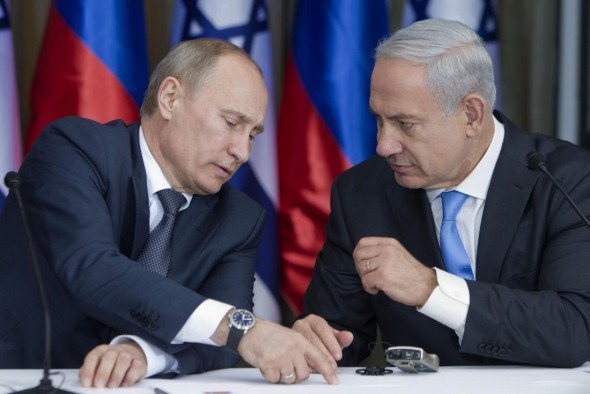
Iran’s Regional Role amid Russia-Israel Negotiations

Political analyst Rahmatollah Fallah has, in an article published on the Basirat news website, weighed in on the recent developments in Israel-Russia relations. The following is the full text of the analytical piece.
The meeting between Israeli Prime Minister Benjamin Netanyahu and Russian President Vladimir Putin during the premier’s trip to Russia on August 23, 2017, was the sixth meeting between them in the past two years. The talks held in the city of Sochi on the coast of the Black Sea were also attended by the Mossad chief and the head of the Israeli National Security Council. The centerpiece of the talks, like in previous meetings, was developments in the regions, including in Syria, and Iran’s role in regional crises, namely the Syria conflict. In the meeting, Netanyahu told Putin that, "We can defeat the ISIS terrorist group through joint efforts, and this is very important; but the bad thing about it is that the destruction of ISIS will allow Iran to gain a foothold.”
Although the Kremlin is no stranger to such remarks by the Israeli regime and has not officially confirmed them, it would be important to figure out what Israeli officials expect of Russia, given that Tel Aviv authorities keep traveling to Russia and rehashing unfounded allegations against Iran. Will Moscow fulfill part of Israel’s demands? This article offers and analysis of the Moscow-Tel Aviv relations as well as the above-mentioned questions.
Objectives of Netanyahu’s Trip to Russia
What basically triggered this trip and other visits to Russia by Israeli leaders over the past two years has been Tel Aviv’s concern over Iran’s role in the region, especially in the Syria crisis. In this regard, the following key points should be taken into account.
1. Opposition to Outcome of Phased Process of Ceasefire
Over the past year, new trends have emerged for a phased settlement of the Syria crisis through the establishment of safe havens and decreasing tension. These trends are the result of multi-layer negotiations by players involved in the Syria conflict. Iran, Syria and Turkey have played a key role in this trend. The US and the UN back the process, too. In such a trend, the position of Syria led by President Bashar Assad as well as the role of Iran and resistance forces is reinforced as a result of the fight against ISIS. The Israeli regime seeks to reverse this trend by pressuring the US and Russia, and subject the presence of resistance forces in Syria to international negotiations. This is while resistance troops are on the ground in Syria at the official request of Damascus.
2. Entering Battlefield in Syria under Pretext of Fighting ISIS
Israel has somehow displayed its tactical objectives in recent years by carrying out airstrikes on Syrian army troops and other resistance forces involved in the fight against ISIS. However, under the current circumstances where fighting is to the detriment of ISIS militants, and the terrorists are leaving the battlefield in Syria, Zionists intend to secure a share for themselves through Washington and Moscow’s backing. This comes as Tel Aviv used to bang the drum for neutrality, which was just an act of deception, and many wounded terrorists were treated in Israeli hospitals.
3. Pushing Iran-Leaning Forces away from Occupied Territories
The Israeli regime tries to get Russia and the U-S to give guarantees that Russia-brokered ceasefire agreements will drive Iran and Hezbollah away from Syria’s borders with occupied Palestinian territories, and that Iran will not be allowed to establish military bases in Syria or any facilities through which it could threaten Israel.
4. Upgrading Regional Talks to Level of Two Global Superpowers
Israel has serious misgivings over the cooperative approach that Iran, Turkey and Russia have adopted in Astana talks aimed at working out mechanisms to settle the Syria crisis. Hence, Tel Aviv wants the US and Russia to hold the key and final talks, and wouldn’t like Muslim regional countries to secure a strategic status in resolving the crisis.
Final Word
What results will Israeli leaders’ consultations with Russian officials about the role of Iran in the region, especially in the Syria crisis, have? The answer to that question hinges on the lasting and effective factors and situation in Syria and the Middle East.
The reality is that under the current circumstances, Iran and the resistance front together with Russia have complementary roles in fighting ISIS. The slightest doubt in this regard can serve the interests of terror groups as well as opposing international players such as the US and Saudi Arabia. At the end of the day, one should bear in mind that Russia, as an international or transregional power, will pursue its leadership requirements and will not be pressured by any regional player, including the Israeli regime. Finally, Russia will, through multilateralism, regulate its relations with opposing regional players simultaneously, and within this framework, can create a certain level of restriction for Turkey, Iran, Israel and Saudi Arabia.
It is important to note that through the prism of constructivism, Iran’s social and ideological association with the Middle East’s social sphere has created potentialities which would enable Iran to enter into talks and cooperation with the most divergent Muslim players in the region in line with international interests. A recent trip to Turkey by Chairman of the General Staff of Iran’s Armed Forces Major General Mohammad Hossein Baqeri as well as a planned visit to Tehran by his Turkish counterpart shows relations among key Muslim nations in West Asia will not be affected by the management of opposing and divergent international powers. The same could be generalized to Syria whose Muslim people can realize that Iran’s actions are part of a strategic jigsaw which is in line with the regional interests of the Muslim world.















